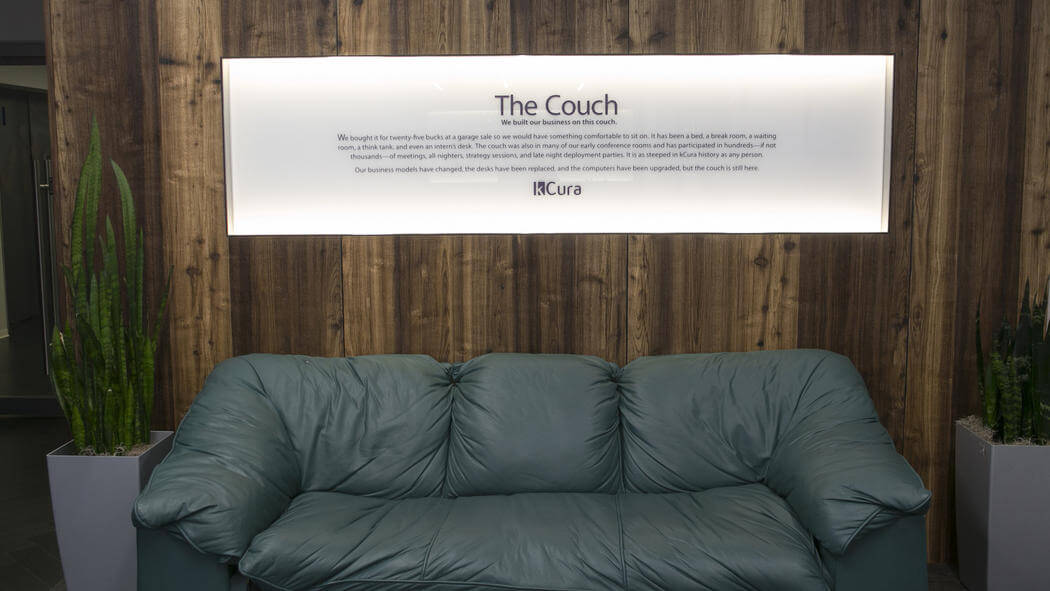Why is Relativity Relevant?
You cannot NOT have heard of Relativity if you work at a big law firm. What gives me confidence in saying that is the software is used by nearly all of the Am Law 200 firms. Even the Department of Justice uses the same software for case reviews.
Relativity is the flagship product and namesake of the Chicago-based eDiscovery company. The company has more than 15 years of experience working in the legal technology industry. Competitive pressures over this period and a natural passion for software development helped founder and CEO Andrew Sieja make Relativity the gem of the software it is today.
To understand the company’s history, you don’t have to go much beyond the reception at the company’s headquarters in Chicago.

This green couch has famously been at the company since it resided in Andrew’s garage during their early days. The message over the couch is simple and reflects the general attitude of the company:
“We built our business on this couch. We bought it for twenty-five bucks at a garage sale so we would have something comfortable to sit on. It has been a bed, a break room, a waiting room, a think tank, and even an intern’s desk. The couch was also in many early conference rooms and has participated in hundreds–if not thousands–of meetings, all-nighters, strategy sessions, and late-night deployment parties. It is as steeped in kCura (now Relativity) history as any person. Our business models have changed, the desks have been replaced, and the computers have been upgraded, but the couch is still here.”
Once upon a time…
The year is 2001. Sieja is a 24-year-old entrepreneur trying to start a business in the city of Chicago. A technologist at heart, he ultimately decides on creating a software consultancy by the name of kCura. At first, Sieja and his small team focused on solving problems strictly in the area of knowledge management.
In 2004, International law firm Foley & Lardner needed a system to manage and review case documents. They hired kCura to develop a solution. Sieja offered a 40% discount on the bid price in exchange for the IP rights to the solution. Foley & Lardner bought it and the rest was history. The fact that kCura was able to successfully retain the rights to the intellectual property served as the first foundation of the software product that the world today recognizes as Relativity.
The company didn’t start selling the software to other firms until 2007. When they did, DLA Piper was one of the first few customers who signed up. DLA ended up generating enough business for kCura that they could take their mind off consulting services. This is when the company started to focus single-mindedly on growing their core eDiscovery software business.
e-Discovery goes to Cloud
Almost a decade later, the company made their comprehensive SaaS product, RelativityOne, available to the public in early 2017. The cloud version allowed users to store data in Microsoft Azure data centers, instead of setting up their own. This provided added security and extensibility to its users while eliminating infrastructure costs.
RelativityOne has continued to expand since its initial introduction. Outside of the United States and the United Kingdom, RelativityOne is now available in Hong Kong and will launch in Canada in Q2, followed by Germany in the second half of the year.
Over 20 customers, including the likes of FTI, Deloitte, and BDO, are now offering the cloud-based solution to their customers.
Rebranding in 2017
The company rebranded itself from kCura to Relativity in August 2017. Sieja says that Relativity as a brand had eclipsed kCura for a long time now and that joining the two brands into one made the most sense for customers.
According to him, kCura is a name from a different era when the company was building collaboration and knowledge management tools. kCura, the word was designed as a mashup of ‘k’ for knowledge and cura, the Latin root for management.
Since 2007, however, the company has been focused on its core product, Relativity.
The company has found success in the e-discovery software market with Relativity and it intends to stay there. He describes that the company’s vision is to simplify and accelerate e-discovery around the world. With the new brand focused on the core product and the rapid growth of RelativityOne.
Moving forward, the Chicago company plans to take on unstructured data problems on a global scale. Follow Relativity on LinkedIn to stay updated with the progress.
Subscribe to our newsletter



